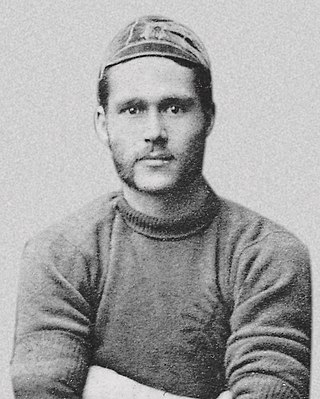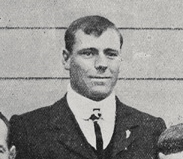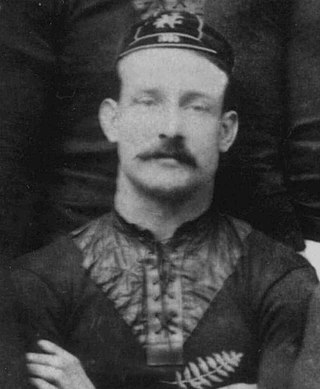Related Research Articles

David Gallaher was an Irish-born New Zealand rugby union footballer best remembered as the captain of the "Original All Blacks"—the 1905–06 New Zealand national team, the first representative New Zealand side to tour the British Isles. Under Gallaher's leadership the Originals won 34 out of 35 matches over the course of tour, including legs in France and North America; the New Zealanders scored 976 points and conceded only 59. Before returning home he co-wrote the classic rugby text The Complete Rugby Footballer with his vice-captain Billy Stead. Gallaher retired as a player after the 1905–06 tour and took up coaching and selecting; he was a selector for both Auckland and New Zealand for most of the following decade.

Joseph Astbury Warbrick was a Māori rugby union player who represented New Zealand on their 1884 tour to Australia and later captained the 1888–89 New Zealand Native football team that embarked on a 107-match tour of New Zealand, Australia, and the British Isles.

Thomas Rangiwahia Ellison, also known as Tom Ellison or Tamati Erihana, was a New Zealand rugby union player and lawyer. He led the first New Zealand representative rugby team organised by the New Zealand Rugby Football Union (NZRFU) on their 1893 tour of Australia. Ellison also played in the 1888–89 New Zealand Native football team on their epic 107-match tour, scoring 113 points, and 43 tries with the side.
Alando Soakai is a former professional rugby union player from New Zealand best known for his time with the Highlanders in Super Rugby and Otago in the ITM Cup, and as captain of Otago in their 2009 and 2010 campaigns. He currently serves on the coaching staff of the Kubota Spears in the Japan Rugby League One, the club where he finished his playing career.
Colin "Col" Windon, was a rugby union player and soldier who captained Australia – the Wallabies – in two Test matches in 1951. By age 18 Windon was playing at flanker for his club Randwick in Sydney's Shute Shield. After serving with the Second Australian Imperial Force in the Pacific Theatre during the Second World War, Windon resumed his rugby career in 1946. He was first selected for Australia for their tour of New Zealand that year. Despite the Wallabies losing both their Tests on tour, Windon impressed with his play.

The 1899 British Isles tour to Australia was the fourth rugby union tour by a British Isles team and the second to Australia; though the first tour in 1888 was a private venture, making the 1899 tour the first official undertaking of Australia. It is retrospectively classed as one of the British Lions tours, as the Lions naming convention was not adopted until 1950.
Edward "Hone" Tyne (1879-1959) was a New Zealand rugby footballer who was part of the professional 1907-1908 New Zealand rugby tour of Great Britain.

Tom "Angry" William Cross was a New Zealand rugby footballer who represented New Zealand in both rugby union and rugby league.
The Otago Rugby League Team are New Zealand rugby league team that represents the Otago Rugby League. They are known as the Whalers. In the past they have been nicknamed the Storm, the Raiders and the 45er's.

Patrick Keogh, also known as Pat Keogh or Paddy Keogh, was a New Zealand rugby union footballer who toured with the 1888–89 New Zealand Native football team. Playing at half-back, Keogh was considered the star player on the tour, which was the first by a Southern Hemisphere team to the British Isles. He played in at least 70 of the team's 107 matches in the British Isles, Australia and New Zealand. After playing for Dunedin club Kaikorai from 1884, he was selected to represent his province of Otago from 1887, and played for them against the touring British Isles team in 1888. By this time Keogh had established himself as the outstanding half-back in New Zealand, and he was approached by Joe Warbrick to tour with the Native team in mid-1888.
George Gothard Aitken was a rugby union footballer who represented New Zealand – known as the All Blacks – and then Scotland. He was born in Westport, New Zealand, and was selected to play provincially for Buller at the age of 16. After moving to Wellington, Aitken played for the province from 1917, and from there was selected for the All Blacks side that faced South Africa when they toured New Zealand in 1921. After only two Test matches for the All Blacks, both as captain, he was dropped from the team. In 1922 Aitken was awarded a Rhodes Scholarship and travelled to England to study at the University of Oxford. He played for the university's rugby club, and from there he was selected for Scotland. He first represented the country in 1924, and in 1925 appeared in all of their Five Nations matches; Scotland won all four of those games, and in doing so achieved their first ever Grand Slam.

George Alfred Tyler was a New Zealand rugby union player who represented New Zealand – the All Blacks – between 1903 and 1906. He played in New Zealand's first seven Test matches, including all five Tests on the pioneering Original All Blacks 1905–06 tour of the British Isles and France. He played club rugby for City in Auckland, and was selected for his province between 1899 and 1911. His brother Bill Tyler also played rugby for City and Auckland before switching codes and representing New Zealand at rugby league.

Ernest Denis Hoben was a New Zealand rugby union administrator who was the figure most responsible for the founding of the New Zealand Rugby Football Union in 1892; he was subsequently elected its first Honorary Secretary.

William Cunningham was a New Zealand rugby union player who represented New Zealand—known as the All Blacks—between 1901 and 1908. Most notably he toured with the Original All Blacks on their 1905–06 tour of the British Isles, France and North America. They were the first New Zealand representative team to visit the British Isles, and of their 32 matches there Cunningham played in 23. He played mainly at lock, and was added to the touring party due to his strong scrummaging ability. He played in three Test matches during the trip: against Scotland, Ireland and France, but did not play in the loss to Wales due to injury, the All Blacks' only defeat on tour.
Thomas Ryan Sonntag was an Australian-born sportsman. He played rugby union and first-class cricket in New Zealand for Otago and competed at highland games in the province during the 1880s.

Alfred Bayly was a New Zealand rugby union player and administrator, and cricketer.
William Theodore Charles Sonntag was an All Blacks rugby union player from Dunedin, New Zealand. He was a Lock.
William "Mac" McKenzie, also known as "Offside Mac", was a rugby union player who represented New Zealand in the 1890s. Playing at wing-forward, McKenzie was first selected for the New Zealand national team on their 1893 tour of Australia, and continued to be selected up until the end of New Zealand's 1897 tour of Australia. In his 20 matches for the national side, McKenzie scored 23 points.

Henry Kiernan, also known as Mickey was a rugby union player who played for New Zealand internationally, including in the side's first ever Test match in 1903. Playing at half-back he represented Wanganui from 1894 till 1899, when he moved to Auckland in 1900. There he continued playing provincial rugby for his new province until 1908.
Robert "Rab" McKenzie, was a rugby union player who represented New Zealand twice in 1893. He first played provincial rugby for Auckland in 1888, including three against the touring 1888 British Isles team. He scored Auckland's first ever try against a British Isles side in the first match, and was in the team less than a week later for the second; the second match resulted in a 4–0 loss for the tourists. He continued representing Auckland until 1891, and the following year was living in the Taranaki, for whom he played provincial rugby that season.
References
- 1 2 3 4 5 Knight, Lindsay. "Barney Armit". allblacks.com. New Zealand Rugby Museum. Retrieved 17 December 2016.
- ↑ "Alexander Mcnaughton Armit in the Scotland, Select Births and Baptisms, 1564–1950" . Ancestry.com Operations. 2014. Retrieved 14 July 2021.
- 1 2 "The Late Alexander M. Armit". Evening Post in Papers Past. 25 November 1899.
- 1 2 McCarthy 1968, p. 24.
- ↑ McCarthy 1968, p. 12.
- ↑ McCarthy 1968, pp. 23–24.
- ↑ McKenzie, William (1 December 1900). "Rugby Football in New Zealand". New Zealand Illustrated Magazine. p. 69. Retrieved 17 December 2016.
- ↑ McLean 1959, p. 10.
- ↑ "Obituary—Alf Bayly". New Zealand Truth in Papers Past. 21 December 1907.